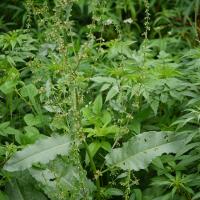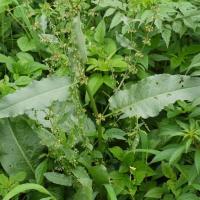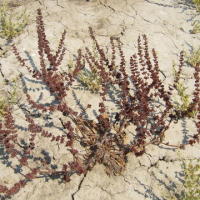Toothed dock
Rumex dentatus
Rumex dentatus, commonly known as toothed dock or western dock, is a herbaceous plant species that belongs to the Polygonaceae family. It is native to various regions in North America and is known for its distinctive toothed leaves. Here is a description of Rumex dentatus:
Appearance:
- Toothed dock is a herbaceous perennial plant that typically grows to a height of 30-90 centimeters.
- The leaves are lance-shaped, and the margins are conspicuously toothed, giving the plant its common name.
- The plant produces inconspicuous greenish flowers on spikes.
- The stems of Rumex dentatus are usually reddish or greenish, and the roots are fleshy.
Habitat:
- Toothed dock can be found in various habitats, including meadows, fields, and disturbed areas.
- It is often seen in grasslands and open, sunny locations.
Lifecycle:
- Rumex dentatus is a perennial plant, meaning it can persist and continue growing for multiple years.
- It reproduces both by seed and vegetatively through its fleshy roots.
Ecological Role:
- Toothed dock plays a role in stabilizing soils and preventing erosion in open habitats.
- The plant is a source of food for various wildlife, including herbivorous insects.
Cultural Uses:
- In some regions, certain parts of Rumex dentatus may have traditional medicinal uses.
Toothed dock, or Rumex dentatus, is a common herbaceous plant species known for its toothed leaves and adaptability to a variety of habitats. While it may have limited cultural and ecological uses, it is primarily a part of the natural plant diversity in grasslands and meadows.










